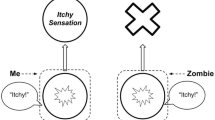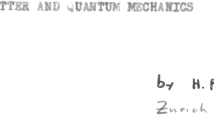Abstract
The objective of this paper is to show that a dualist model is not only possible but also most appropriate in order to understand the problem of consciousness and the existence of Free Will. By “dualist” we refer to the assumption that reality cannot be explained exclusively by observable causes in space-time. The dualist view we speak about here does not totally correspond to the classical conception of “dualism,” according to which matter and consciousness would be two radically separate things.
The first part of this paper is dedicated to EPR-type experiments which show that no matter what the interpretations are, we are obliged to call into question the classical notions of time and space and obliged to accept that ultimate reality cannot be localized in or be dependent on time and space.
In the second part I will be arguing that in order to be understood the experiments of Benjamin Libet must be studied in a dualist framework, even though Libet was not himself a dualist. A Copernican revolution is therefore possible not only in our understanding of the world but also in our comprehension of the nature of consciousness.
Access this chapter
Tax calculation will be finalised at checkout
Purchases are for personal use only
Similar content being viewed by others
Notes
- 1.
This idea is the result of a conversation about this subject with Jean-François Lambert.
- 2.
Some research shows that the “out of body experiences” described by some people who have been close to death might not be an illusion as is generally thought (Van Lommel et al. 2001; Sabom and Kreutzinger 1978; Sabom 1983). Benjamin Libet himself has refined a protocol for testing the reality of this phenomenon in a rigorous fashion (Libet 2004, p. 216–219).
References
Beck, F, & Eccles, J. (1992). Quantum aspects of brain activity and the role of consciousness. Proceedings of the National Academy of Sciences of the USA, 89, 11357–11361.
Bell, J. (1987). Speakable and unspeakable in quantum mechanics. Cambridge: Cambridge University Press.
Bricmont, J. (1995). Contre la philosophie de la mécanique quantique. In R. Frank (Ed.), Les sciences et la philosophie. Quatorze essais de rapprochement. Paris: Vrin.
Dennett, D. (1993). La conscience expliquée. Paris: Odile Jacob.
d’Espagnat, B. (1979). A la recherche du réel. Paris: Gauthier-Villars.
d’Espagnat, B. (1980). Théorie quantique et réalité. Pour la Science, 27, 72–87
d’Espagnat, B. (1982). Un atome de sagesse. Paris: Seuil.
d’Espagnat B. (1994). Le réel voilé. Paris: Fayard.
d’Espagnat, B. (2002). Traité de physique et de philosophie. Paris: Fayard.
Feynman, R. (1979). La nature de la physique. Paris: Seuil.
Gell-Mann, M. (1985). Le Quark et le Jaguar. Paris: Albin Michel.
Gisin, N. (2013). Are there quantum effects coming from outside space-time? Nonlocality, freewill and “no many worlds”. In A. Suarez & P. Adams (Eds.), Is science compatible with free will? New York: Springer. Chapter 3.
Jordan, P. (1936). Anschauliche Quantentheorie. Berlin: Springer.
Libet, B. (1985). Unconscious cerebral initiative and the role of conscious will in voluntary action. The Behavioral and Brain Sciences, 8, 529–566.
Libet, B. (1999). Do we have free will? Journal of Consciousness Studies, 6(8–9), 47–57.
Libet, B. (2004). Mind time. Cambridge: Harvard University Press.
Mele, A. (2013). Free will and neuroscience: Revisiting Libet’s studies. In A. Suarez & P. Adams (Eds.), Is science compatible with free will? New York: Springer. Chapter 13.
Ortoli, S., & Pharabod, J.-P. (1984). Le cantique des quantiques. Paris: La Découverte.
Sabom, M. (1983). Souvenirs de la mort. Paris: Robert Laffont.
Sabom, M., & Kreutzinger, S. (1978). Physicians evaluate near death experience. Theta, 6, 1–6.
Selleri, F. (1986). Le grand débat de la théorie quantique. Paris: Flammarion.
Sokal, A., & Bricmont, J. (1997). Impostures intellectuelles. Paris: Odile Jacob.
Suarez, A. (2013). Free will and nonlocality at detection as basic principles of quantum physics. In A. Suarez & P. Adams (Eds.), Is science compatible with free will? New York: Springer. Chapter 5.
Van Lommel, P., et al. (2001). Near-death experience in survivors of cardiac arrest: A prospective study in the Netherlands. The Lancet, 358, 2039–2045.
Author information
Authors and Affiliations
Corresponding author
Editor information
Editors and Affiliations
Rights and permissions
Copyright information
© 2013 Springer Science+Business Media, LLC
About this chapter
Cite this chapter
Staune, J. (2013). Towards Non-physical Realism. In: Suarez, A., Adams, P. (eds) Is Science Compatible with Free Will?. Springer, New York, NY. https://doi.org/10.1007/978-1-4614-5212-6_14
Download citation
DOI: https://doi.org/10.1007/978-1-4614-5212-6_14
Published:
Publisher Name: Springer, New York, NY
Print ISBN: 978-1-4614-5211-9
Online ISBN: 978-1-4614-5212-6
eBook Packages: Behavioral ScienceBehavioral Science and Psychology (R0)




